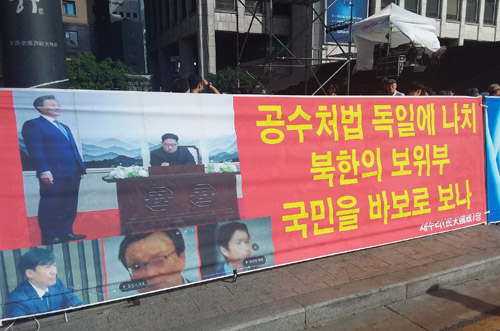by WorldTribune Staff, December 1, 2019
Several South Koreans are going on hunger strikes in front of the presidential Blue House in Seoul to protest what they say is the Moon Jae-In government’s undermining of separation of powers under the guise of “judicial reform.”
Tara O, Director at East Asia Research Center, authored a report concluding that hunger strikes were precipitated by the Moon administration’s proposals that will “harm South Korea’s identity as a republic: a law to create a new investigative unit targeting senior officials (Gongsoocheo).”

Gongsoocheo would essentially place South Korea’s judiciary branch under President Moon Jae-In, the report noted.
Creating Gongsoocheo, an organization that would investigate senior government officials for corruption, “initially does not sound like an issue worthy of a hunger strike, until one discovers what it really is,” Tara O wrote.
President Moon and and his supporters in the legislature “do not explain to the public what Gongsoocheo is, but rather wrap it into what they claim is a ‘prosecution reform.’ They do not explain why Gongsoocheo is needed when there are the prosecutors, inspector generals, and other investigative bodies at various government entities. It also does not explain what Gongsoocheo implies.”
Gongsoocheo “gives the president greater power in investigating other senior officials, including judges, prosecutors, and police chiefs. It can be misused directly by the president to target his political opponents, suppress freedom of speech, and generally create an atmosphere of fear — all for greater control.”
Related: Massive conservative protests rock Seoul government; Powerful leftist resigns, October 14, 2019
North Korea’s Ministry of State Security, according to the report, “is used for a similar purpose in that it targets the power elites, instills fear, and is a tool for the leader to control the elites.”
The political parties supporting the Gongsoocheo proposals “are already in line with Moon Jae-In’s wishes,” Tara O wrote. “Although there are numerous political parties, many of them share the same ideology and policy direction as Moon and his party.”
This prompted Hwang Kyo-ahn, the leader of the main opposition party Liberty Korea Party, to state: “…they took over the administration, took over the legislature, and now the last puzzle piece left is the Gongsoocheo law. The Gongsoocheo law is definitely not a well-meant [piece of legislation] that punishes powerful and senior-ranking individuals (who are corrupt) according to law.”
Gongsoocheo “practically destroys the separation of powers within the South Korean government — a key pillar of liberal democracy — by placing the judiciary branch under the president, which damages the liberal democratic system of South Korea. As such, Gongsoocheo is extremely dangerous for South Korea.”
The demonstrators on Oct. 3, 2019 pointed out that North Korea and China have the same type of organizations, and Nazi Germany had such an organization for “investigating” senior officials, and they strongly opposed the creation of Gongsoocheo.
Meanwhile, in a Dec. 1 report for Korea Times, Jhoo Dong-Chan wrote that the South Korean government “is facing mounting criticism for doing nothing about 10 North Korean defectors who were apprehended in Vietnam and immediately deported to China.”
Peter Jung, a Christian pastor who is active in helping North Koreans escape, said during a telephone interview with Voice of America that the 10, including one teenager and two men in their 20s, were stopped in the border area of Vietnam last month.
Jung said the defectors are missing after Vietnamese border guards handed them over to their Chinese counterparts.
Jung claimed he asked the South Korean embassy for help, but officials there did nothing.
“One of these defectors who had a cell phone called the Korean embassy in Vietnam,” he said.
“The Korean officials there said they should wait. They never visited or returned the phone call. For six days, the Korean authorities did nothing with their arms folded.”
According to reports, the defectors left China and tried to enter Vietnam on Nov. 21 after being guided by “escape brokers.”
The defectors were reportedly apprehended in the border area between Vietnam and Laos by the Vietnamese border guards on Nov. 28 and were deported to China immediately after questioning.
“An increasing number of North Korean defectors are choosing Vietnam as a gateway to Seoul as ties between Seoul and Hanoi are growing following Korean companies’ boosting of their investments in the country,” Jhoo wrote for Korea Times.
Intelligence Brief __________ Replace The Media
